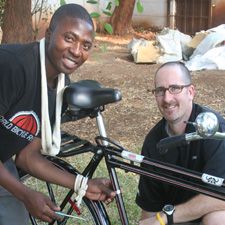World Bicycle Relief president F.K. Day says all answers reside in the field. So I am going into the field to understand the impact of bicycles in rural communities in Africa. I'm in Zambia as part of the World Bicycle Relief Million Dollar Ride, a fundraising trip to raise money for the non-profit organization Day started almost five years ago to bring bicycles to impoverished areas to increase mobility and productivity.
Today's program overview introduced me and the 15 others on the trip to WBR and the organizations it has partnered with to deliver bicycles to those most in need. These organizations are headed by visionary leaders who are as passionate as they are business-minded. Yet they remain unassuming, which may be their greatest strength. Rather than believing they know all the answers, they go into the communities they serve and listen to the people to determine their needs.
In the case of bicycles, most of those needs have never been met. F.K. said the existing bikes in Zambia before WBR entered the market were junk that stunted the ability of the bicycle to help people. By supplying quality bikes that are well spec'd and properly assembled, WBR can meet the needs of the end user and improve their quality of life.
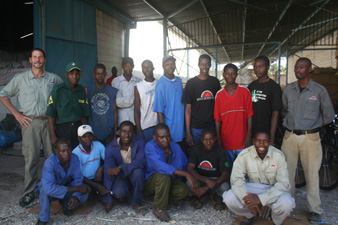 F.K. Day with some of the 25 assembly workers at the TATA assembly plant in Lusaka who build WBR bikes. The bikes come from TATA India four to a box as a CKD (Complete Knockdown), completely unassembled. WBR has retooled the system so that instead of assembling a bike start-to-finish, workers have specific tasks like wheel building or frame assembly as part of an assembly line. Assemblers on average can build 100 bikes and a maximum of 120 bikes per day.
F.K. Day with some of the 25 assembly workers at the TATA assembly plant in Lusaka who build WBR bikes. The bikes come from TATA India four to a box as a CKD (Complete Knockdown), completely unassembled. WBR has retooled the system so that instead of assembling a bike start-to-finish, workers have specific tasks like wheel building or frame assembly as part of an assembly line. Assemblers on average can build 100 bikes and a maximum of 120 bikes per day.
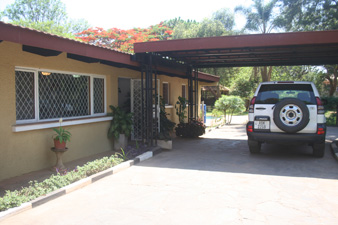 The WBR Africa headquarters. Director of African operations Dave Neiswander said it's common in Lusaka to see old houses turned into a business office. Next door to WBR is the office for RAPIDS, with which WBR has partnered to help reach people affected by HIV/AIDS in Zambia.
The WBR Africa headquarters. Director of African operations Dave Neiswander said it's common in Lusaka to see old houses turned into a business office. Next door to WBR is the office for RAPIDS, with which WBR has partnered to help reach people affected by HIV/AIDS in Zambia.
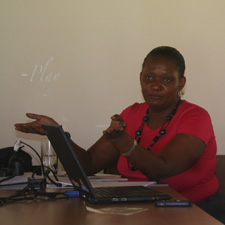 As chief of party (the best title ever) for RAPIDS, Batuke Walusiku has harnessed funding from the U.S. government to train 19,800 volunteer caregivers to go into households and provide basic care for those affected by HIV/AIDS. The unpaid workers receive a bicycle through a work-to-own program—they keep the bicycle if they stay in the program for two years. That incentive has increased productivity and resulted in a 97 percent retention rate over four years.
As chief of party (the best title ever) for RAPIDS, Batuke Walusiku has harnessed funding from the U.S. government to train 19,800 volunteer caregivers to go into households and provide basic care for those affected by HIV/AIDS. The unpaid workers receive a bicycle through a work-to-own program—they keep the bicycle if they stay in the program for two years. That incentive has increased productivity and resulted in a 97 percent retention rate over four years.
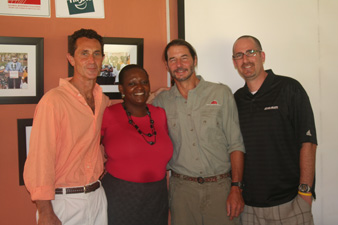 The visionaries: Bruce Wilkinson, regional vice president of World Vision, Batuke Walusiku, chief of party for RAPIDS, F.K. Day, president of World Bicycle Relief, and David Zimberoff, director of global marketing for SRAM. WBR's success has come through strong partnerships with established organizations like World Vision that give it access to communities in Zambia. World Vision has the imbedded relationships and local infrastructure to link WBR to the people in the communities where bikes are needed.
The visionaries: Bruce Wilkinson, regional vice president of World Vision, Batuke Walusiku, chief of party for RAPIDS, F.K. Day, president of World Bicycle Relief, and David Zimberoff, director of global marketing for SRAM. WBR's success has come through strong partnerships with established organizations like World Vision that give it access to communities in Zambia. World Vision has the imbedded relationships and local infrastructure to link WBR to the people in the communities where bikes are needed.
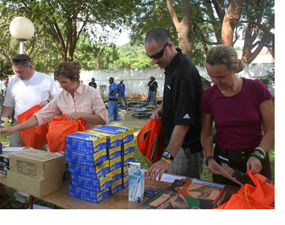 Assembling kits for caregivers to care for HIV/AIDS patients as well as those suffering from malaria and TB. Caregiver kits are equipped with basic supplies such as antibacterial soap, antifungal cream, pain relievers and latex gloves to help prolong the lives of those living with AIDS in Zambia. Everyone here is affected by AIDS: among adults ages 15 and 49, 14 percent have HIV/AIDS.
Assembling kits for caregivers to care for HIV/AIDS patients as well as those suffering from malaria and TB. Caregiver kits are equipped with basic supplies such as antibacterial soap, antifungal cream, pain relievers and latex gloves to help prolong the lives of those living with AIDS in Zambia. Everyone here is affected by AIDS: among adults ages 15 and 49, 14 percent have HIV/AIDS.
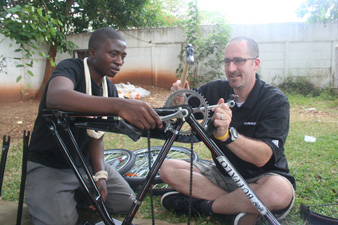 SRAM's David Z builds a bike with Benjamin using a hammer to attach the cranks. The bike, which F.K. says is like an SUV, is designed to be durable, carry several hundred pounds and be easily repaired. F.K. says the goal is for the bikes to be so easy to maintain they can be fixed with a rock or a hammer.
SRAM's David Z builds a bike with Benjamin using a hammer to attach the cranks. The bike, which F.K. says is like an SUV, is designed to be durable, carry several hundred pounds and be easily repaired. F.K. says the goal is for the bikes to be so easy to maintain they can be fixed with a rock or a hammer.
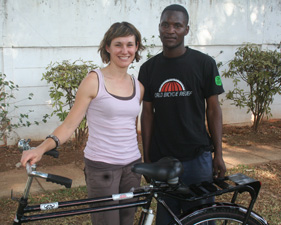 The finished bike I built with Maybin. The single-speed, coaster-brake bike will require some getting used to as I ride it over the next few days in the field to see first-hand the three critical areas that WBR has targeted: healthcare, education and microfinance.
The finished bike I built with Maybin. The single-speed, coaster-brake bike will require some getting used to as I ride it over the next few days in the field to see first-hand the three critical areas that WBR has targeted: healthcare, education and microfinance.

